Old Mill Avenue is dead. Long live the old Mill Avenue: OG Tempe restaurants enter new era
For decades, ASU students and Tempe residents have flocked to Mill Avenue for dinners and nights out. But, much like each new graduating class, the restaurants, even those considered fixtures, are ever-changing. Once a haven of indie stores and mom-and-pop restaurants, in recent years the stretch is becoming more akin to Old Town Scottsdale with fast casual chains and upscale hangouts catering not only to students from the nearby university, but increasingly to young professionals working at the many new tech companies on the waterfront.
"There's kind of an old Mill and a new Mill. And I feel like we're kind of breaking into this era of the new Mill," said Jess Italiano, owner of Caffe Boa, a restaurant that opened in a historic building in 1994.
"With old Mill, we had Rula Bula and House of Tricks. We had some iconic spots that were what we call staples of Tempe," she said. "But these places have all kind of served their duty and successfully retired or moved on. So, as sad as that is, it's also very exciting, because it means new space for something hopefully great to come through."
Italiano represents a merging of the new and old Mill. After working at Caffe Boa for several years as a server, she and her business partner bought the restaurant five years ago when the previous owner decided to retire. She's now the young face of the nearly three-decades-old restaurant and community staple.
"Our building is a historic building, so I think that kind of draws people into a bit of like, an old-timey era. When they walk in, they see the brick and the molding, and they feel really good about that. It's something you don't often see around here," Italiano said of the restaurant, whose dark wooden floors and brown accents create a warm and comforting vibe, enhanced by the smell of pasta wafting through the quiet dining room. It's an easygoing, family-friendly escape from the nightclubs down the street.
"Restaurants are coming and going, but that doesn't mean it's all chains. There are still tons of independent restaurants springing up to replace the older classics whose owners have retired," Italiano said.
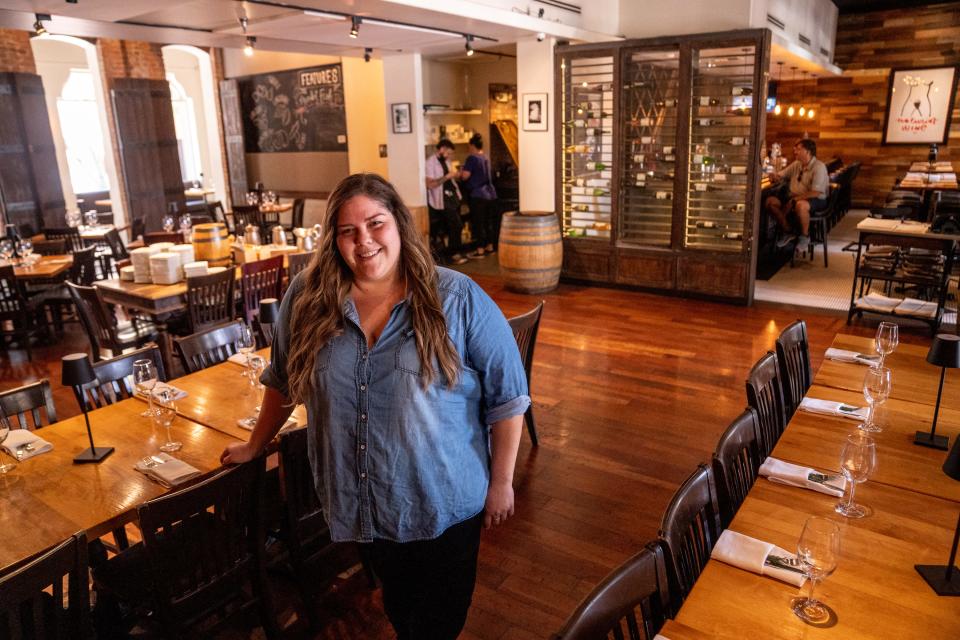
New Mill Avenue is not all chain restaurants
One of the newest restaurants is Matsuri Izakaya on Mill. The ramen shop is located on Mill Avenue and 7th Street near C.A.S.A.
Everything about the interior of the restaurant screams "new Mill Avenue." Guests are encouraged to seat themselves and then order on their phones from a QR code menu. Large TVs over the bar play anime and the occasional sports game. On a hot June afternoon, a handful of Gen Z-aged patrons slurped on ramen while alternating working on computers and chatting with friends.
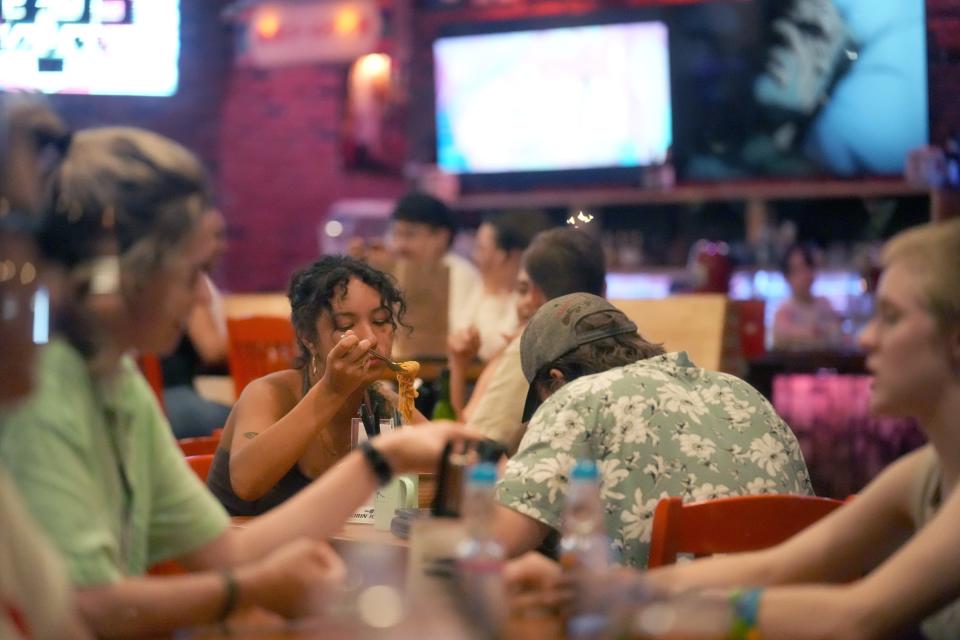
Tyler Wells of Jin Hospitality was one of the people who helped open the izakaya. As an eccentric, twenty-something restaurateur, he acted as a window into the college-town vibe that he and the rest of the Jin Hospitality team were striving for when opening a restaurant in a fast-changing city full of young people who are constantly looking for the next cool thing to try.
"You could have the best food or you could have the best service, but unfortunately for making a restaurant run, especially down here, it doesn't matter. It's so many other factors that make you successful," Wells said.
Social media played a big role in a successful launch, with influencers flocking to the new space and providing free advertising to the youthful Tempe crowd. Another factor, Wells said, is the restaurant's ability and willingness to adapt to its audience's needs.
"A big fight was about having fries on our menu," he said. "We didn't want fries for a long time, but then the second we put them on the menu, you know, it's a college town. You come in, you watch anime, you order a beer and you're eating fries at a Japanese place, and sometimes that sells better than trying to only sell your authentic udon Japanese ramen."
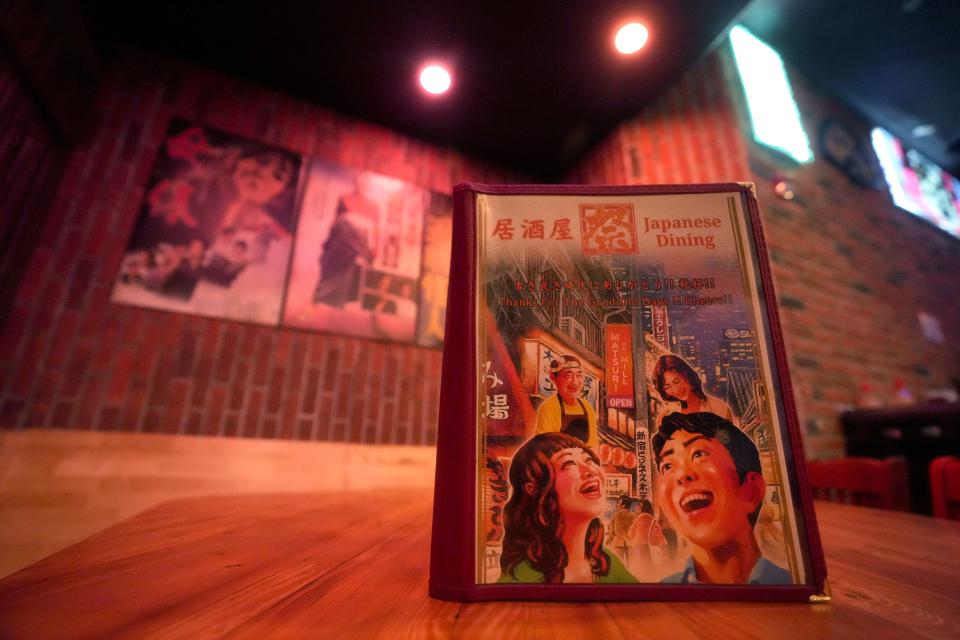
Wells said the best way to ensure that a business can stay open for a long time is to own the property where you operate.
"That's where the money is at. Why choose to rent a place if you know you're gonna be there for more than a couple of years? You might as well buy it," Wells said.
It's also a way to guard against being priced out of a particular location as an area grows and real estate prices rise.
One of many examples is Rula Bula, a Mill Avenue Irish pub that closed after 20 years in 2021 when the landlord sold the building to a new tenant without offering an opportunity to renew the lease. Sake Haus, a clubby sushi bar with a location on Roosevelt in downtown Phoenix was set to open in the space, but two years later, the bar is still empty. Recently owner Julian Wright told The Republic that he's rethinking the concept, but has yet to announce new plans.
As Tempe grows, old hotspots struggle to keep up
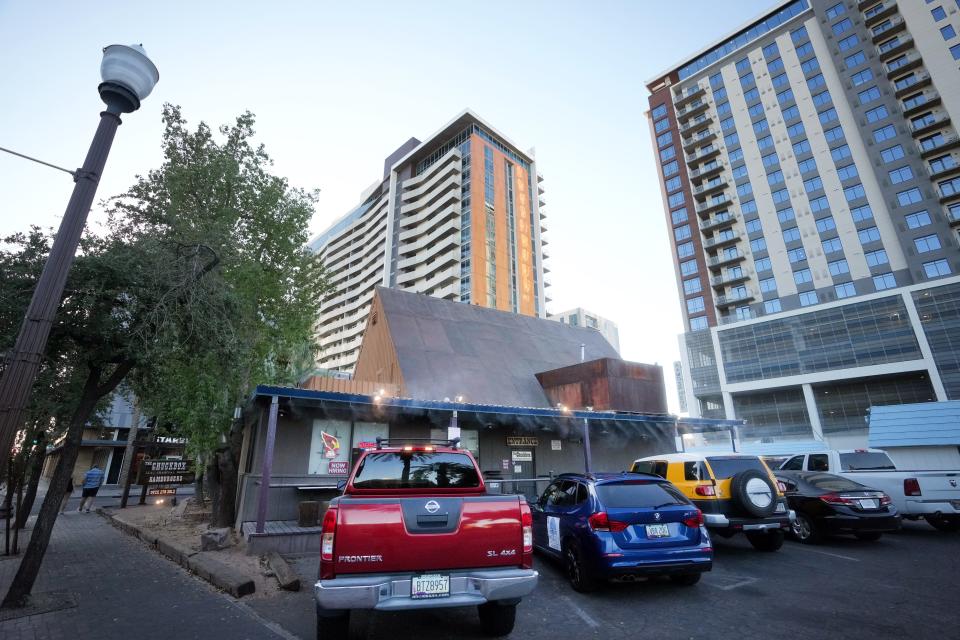
Even longtime restaurant owners who do own real estate on Mill Avenue face challenges.
On the corner of University Drive and Forest Avenue, surrounded by ASU classrooms and high-rise apartment buildings, sits a small, easy-to-miss, brown building. Wagon wheels and wooden barrels sit outside the door, over which a sign reads "entrance" in a wild west motif.
The Chuckbox opened its doors in 1972 and has hardly changed since — not the rustic design of the building, nor the award-winning hamburgers and chicken sandwiches on the menu. Not even the employees, many of whom have worked at the restaurant for decades, like Paul Marquardt, a supervisor who has worked at The ChuckBox for 50 years, and manager Chris Guthrie, who's been there over 20 years. And fans of the restaurant wouldn't have it any other way.
"The reason that we're still here is because we really haven't changed anything. It's pretty much the same as it was 50 years ago. We have people coming in and going, 'Yeah, my dad used to bring me here when I was little kid, or you know, our family used to come here back in the 70s, and we're still coming'," Marquardt said.
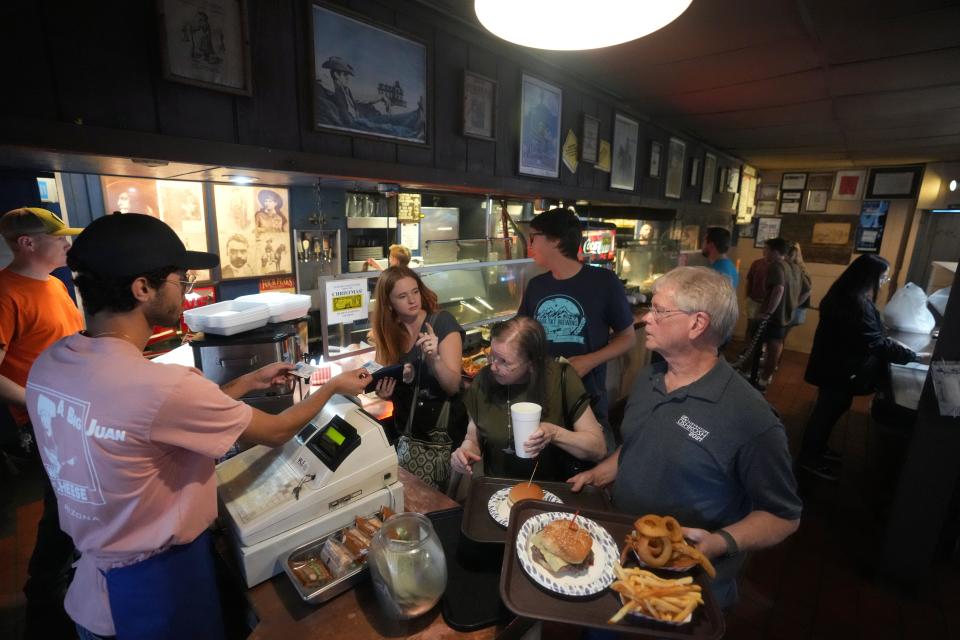
Marquardt, a self-proclaimed "Mill Avenue punk" in his youth, has seen first-hand the growth of downtown Tempe from a small college town to a city of towering skyscrapers.
"Between us and next door, it hasn't really changed a lot. Obviously, there's a gravel parking lot, there's the Original ChopShop. And I hope it stays like that. But you know, obviously across the street from us now there's a 25-story high rise, and right behind us there's a 25-story high rise. It does create a lot of problems for us on the property," Marquardt said.
Out front, a small parking lot can accommodate about a dozen cars. A few decades ago, the empty lot across the street was a large public parking lot. But those days are long gone. In place of the former parking lot is an apartment building with chain restaurants on the ground level.
"We have limited parking. And I don't think that the city has been very considerate to people like The ChuckBox in that, they have Nekter, Insomnia Cookies, Starbucks, all these places around the corner with no public parking. So, everyone wants to park in our parking lot and just walk next door. But we're busy. We don't have any extra space. And as a small business, it's been a struggle adapting to that," Marquardt said.
"Even if you Google Nekter, it tells you that their parking is here. And so for us, especially during our peak times, it becomes really challenging to try to kind of fend off people that aren't coming to us," Guthrie said.
It's not just customers going to Starbucks to study, either, Marquardt said. Perhaps the biggest parking related issue is people working for delivery services like Uber Eats or Grubhub who park in the ChuckBox parking lot for five minutes or less to pick up an order from a neighboring restaurant and then leave. This takes up spaces from potential ChuckBox customers and creates a busy atmosphere in the parking lot, which hurts business.
"It's hard because they don't make any more land. And with how quickly the population is growing, and how many businesses and hotels and apartments are going up in such a small radius around us. I don't think there was much foresight into, you know, adding 100,000 people in downtown Tempe, what that would do in terms of not only parking, but public transit, and just in general the health and well-being of the community and small businesses," Guthrie said.
Tempe's challenges are also opportunities
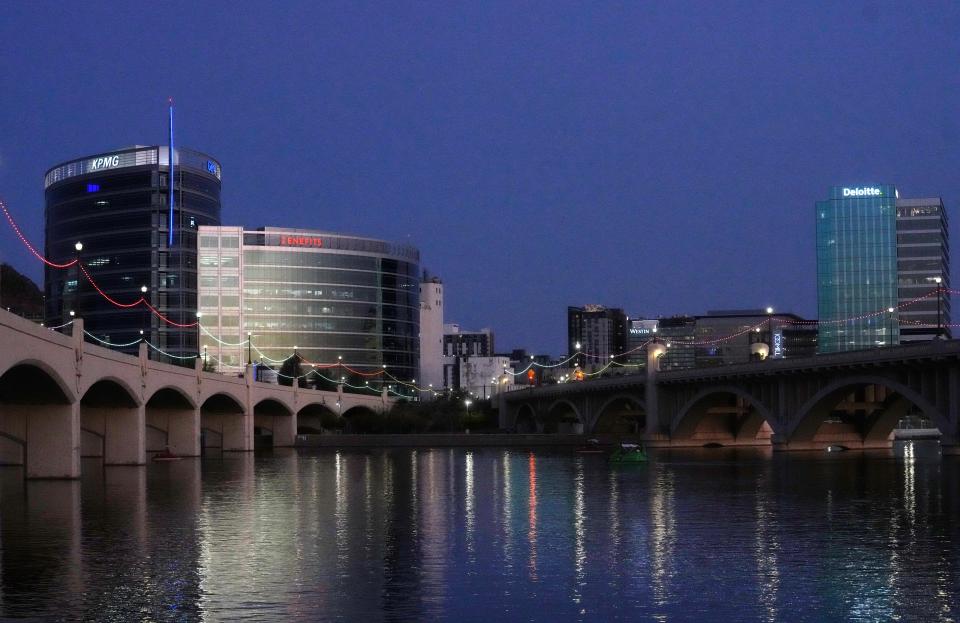
Guthrie feels that the rapid development of the city is both a blessing and a curse.
"For us, it really allows us to stand out. With corporate everywhere, I think more and more people are looking for those small mom and pop places to support, which is really beneficial for us," Guthrie said. "But outside of Tempe, and our 50 years' worth of graduates that we've had, we don't have the name recognition of a Starbucks. When you drive down it's all brand-new hotels and brand-new condos, and then you see this a-frame looking shack on the corner of the road with smoke coming out, going, 'what the heck is that? I gotta either check that out, or I gotta stay away from them'."
The Chuckbox has outlasted many of its friends and competitors in downtown Tempe. But it wasn't always easy to do so. Like most dining establishments, the COVID-19 lockdowns were an especially difficult time, since then, the exponential growth has introduced new issues. And the continued grown and development of Tempe will no doubt bring new challenges. But the Chuckbox team see themselves as a constant in an oft-changing community.
"We enjoy being that Tempe time capsule," Guthrie said.
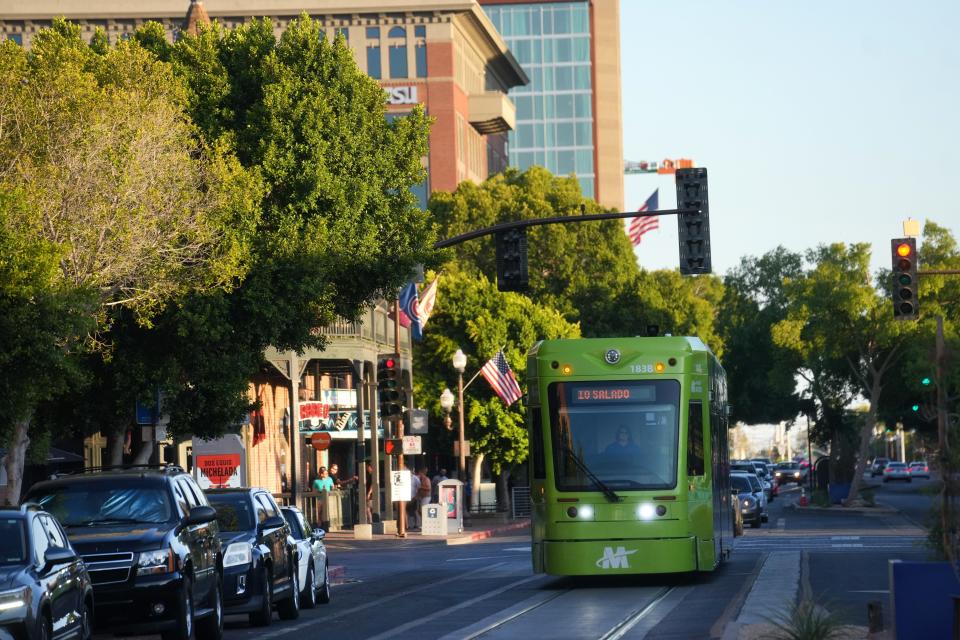
Even as Tempe grows, to longtime residents it's 'still a college town'
The Chuckbox's tenure in Tempe is a rarity, but the newer Mill Avenue staples dream of a legacy just as long. And the rapid development might end up helping.
"Increase in businesses, like hotels and tech companies, bring tourists and young professionals who help keep the city alive even when ASU students and faculty go home for the summer," Italiano said.
Just recently, Tempe has introduced businesses like the Omni Hotel at ASU, which create hundreds of jobs in the area, attracting new residents. And future projects like the Novus Innovation Corridor will add even more to the lively city. And even as a wave of chains move in with the new developments, the appeal of a mom-and-pop restaurant is impossible to replicate.
"You've got so many of these corporate places trying to chase the new fad. And as hard as they work to keep up with that, we work just as hard if not harder to stay the same. Because for us, so much of our success has been that nostalgia factor," Guthrie said.
"I definitely still see (Caffe Boa) here for quite a long time," Italiano said.
Longtime residents remain dedicated to preserving the culture that they've grown to love, built around the University and supported by the year-round community.
"They're trying to make it more like Scottsdale," said Wells. "But, it's still a college town."
Reach the reporter at [email protected]. Follow @EndiaFontanez on Twitter.
Support local journalism. Subscribe to azcentral.com today.
This article originally appeared on Arizona Republic: Historic Tempe restaurants adapt to survive in a new era for Mill Ave
